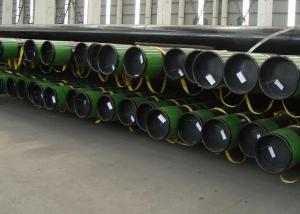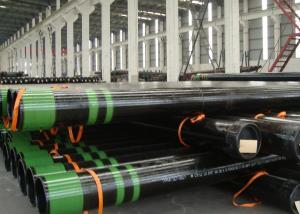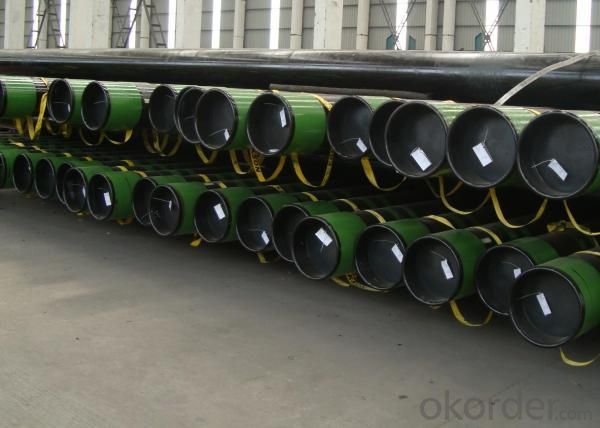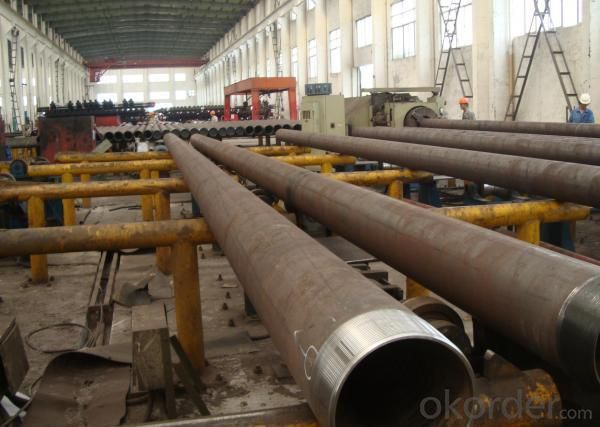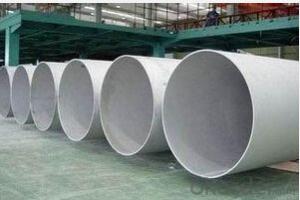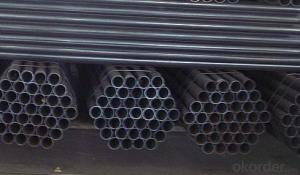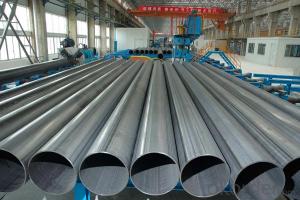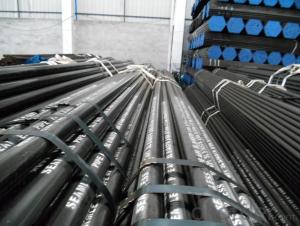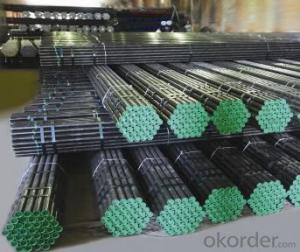BS 1387 Oil Tubing and Tubing Pipe
- Loading Port:
- Baoshan Port
- Payment Terms:
- TT or LC
- Min Order Qty:
- 50T m.t.
- Supply Capability:
- 5000 Tons Per Month m.t./month
OKorder Service Pledge
OKorder Financial Service
You Might Also Like
API Specification 5CT / ISO 11960:2001
Packaging & Delivery of oil tubing
Packaging Detail: Wrapped in bundle with steel strip
Delivery Detail: 30~50 days
Specifications of oil tubing
1. Manufaturer of billet and seamless steel pipe
2.Superior quality with moderate price
3. Wide size range
4.Quick delivery
Item: | Seamless Steel Pipe |
1. Outer Diameter: | 73mm-720mm (2.1/2inch -28inch) |
2. Wall Thickness: | 4mm-30mm |
3. Length: | 6m-12m |
4. Producing Standard: | American ASME B36.10M, ASTM, API 5L, API 5CT |
Japanese JIS | German DIN |
Chinese GB | BS standard |
5. Main Material: | (Carbon Steel & Low Alloy steel) |
ASTM A53, A106, A210, A252, A333, etc; | X42, X46, X52, X60, X65, X70, etc; |
The productive process of Oil Tubing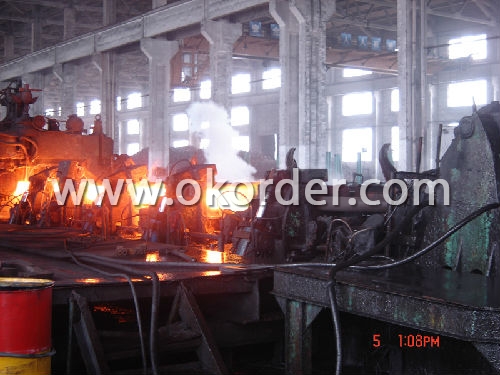
Air cooling
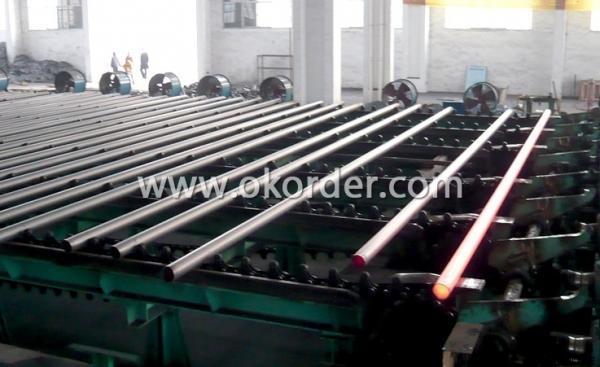
The package of steel oil tube
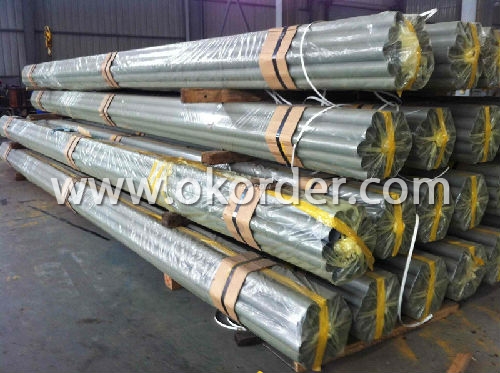
Oil tube Stock
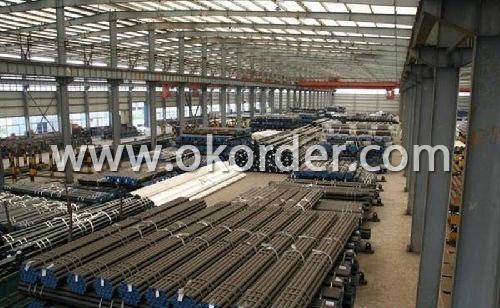
- Q: Can steel pipes be used for underground pressure pipelines?
- Yes, steel pipes can be used for underground pressure pipelines. Steel pipes are known for their strength and durability, making them suitable for various applications, including underground pressure pipelines. They can withstand high pressure and are resistant to corrosion, making them a reliable choice for transporting fluids or gases underground. Additionally, steel pipes are available in different sizes and thicknesses, allowing for customization based on the specific requirements of the pipeline project. However, it is important to ensure proper coating or lining of the steel pipes to prevent corrosion caused by soil conditions or the transported substance. Regular maintenance and inspections are also necessary to ensure the integrity and longevity of the underground pressure pipelines made of steel pipes.
- Q: How can galvanized steel tubes be painted on the surface?
- The market is commonly used in alkyd iron red primer, iron red epoxy primer are not suitable for galvanized parts, otherwise it is easy to fall off. It is important to point out that the saponification of the galvanized sheet with alcohol, acid and paint will result in the failure of the coating and the damage of the original zinc coating.
- Q: Which is better, galvanized steel pipe or stainless steel?
- Most of the use requirements are to maintain the original appearance of the building for a long time. In determining the type of stainless steel to be chosen, the main consideration is the aesthetic standards required, the corrosivity of the atmosphere in the area, and the cleaning system to be adopted. However, other applications increasingly seek only structural integrity or watertightness. For example, the roof and side walls of industrial buildings. In these applications, the construction cost of the owner may be more important than the aesthetic, the surface is not very clean can also. The use of 304 stainless steel in a dry indoor environment is quite effective.
- Q: Can steel pipes be used for hydropower generation?
- Yes, steel pipes can be used for hydropower generation. Steel pipes are often used in the construction of hydroelectric power plants to transport water from a higher elevation to lower areas, where the water's kinetic energy is converted into mechanical energy to generate electricity. The durability and strength of steel pipes make them suitable for this purpose, as they can withstand the high pressure and flow rates of water in hydropower systems.
- Q: What is the role of steel pipes in the renewable energy sector?
- Steel pipes play a crucial role in the renewable energy sector by facilitating the transportation and distribution of various energy sources. One significant application of steel pipes is in the construction of pipelines for transporting natural gas, which is increasingly being used as a cleaner alternative to traditional fossil fuels. These pipelines are often made of steel due to its strength, durability, and resistance to corrosion, ensuring the safe and efficient delivery of natural gas to power plants and other energy consumers. Moreover, steel pipes are utilized in the installation of geothermal energy systems. Geothermal energy harnesses the heat from the earth's core to generate electricity or provide heating and cooling. Steel pipes are used to create geothermal wells, allowing for the extraction of hot water or steam from underground reservoirs. These pipes must withstand high temperatures and pressures, making steel an ideal material for this application. Additionally, steel pipes are employed in the construction of hydraulic systems for hydroelectric power plants. These plants rely on the force of flowing water to generate electricity, and steel pipes are used to convey water from the reservoir to the turbines. The durability and reliability of steel ensure the efficient transmission of water, enabling hydroelectric power plants to produce clean and renewable energy. In the renewable energy sector, steel pipes also play a role in the construction of solar power plants. Solar thermal systems use mirrors or lenses to concentrate sunlight and generate heat, which is then transferred to a fluid to produce steam and drive turbines. Steel pipes are essential for circulating and transferring this fluid, ensuring the effective operation of the solar power plant. In summary, steel pipes are indispensable in the renewable energy sector for their strength, durability, and resistance to corrosion. They enable the transportation of natural gas, the extraction of geothermal energy, the transmission of water in hydroelectric power plants, and the circulation of fluids in solar power plants. By facilitating the efficient distribution of various energy sources, steel pipes significantly contribute to the growth and sustainability of the renewable energy sector.
- Q: What are the different methods of pipe welding for steel pipes?
- Steel pipes can be welded using various methods, each with its own advantages and applications. Here are some commonly used techniques: 1. Stick welding, also called Shielded Metal Arc Welding (SMAW), involves manually melting a consumable electrode coated in flux. The flux creates a protective shield around the weld pool. SMAW is versatile and can be used in different positions, making it suitable for both field and workshop applications. 2. Gas Metal Arc Welding (GMAW), also known as MIG welding, uses a continuous wire electrode fed through a welding gun. The gun supplies a shielding gas, such as argon or a mixture of argon and carbon dioxide, to protect the weld pool from contamination. GMAW is known for its high welding speed and is commonly used in industrial settings. 3. Flux-Cored Arc Welding (FCAW) is similar to GMAW, but the wire electrode is filled with flux instead of relying on an external gas. The flux creates a protective shield around the weld pool, eliminating the need for a separate gas supply. FCAW is often used in outdoor and windy conditions for better protection against contamination. 4. Gas Tungsten Arc Welding (GTAW), also called TIG welding, uses a non-consumable tungsten electrode to create the weld. A separate shielding gas, typically argon, is used to protect the weld pool. GTAW produces high-quality welds with excellent control, making it suitable for precision applications. 5. Submerged Arc Welding (SAW) is an automated process that uses a continuously fed wire electrode and a granular flux poured over the weld joint. The arc is submerged beneath the flux, providing excellent protection against contamination. SAW is commonly used in heavy fabrication and pipeline industries due to its high deposition rates and deep penetration capabilities. These are just a few of the methods available for welding steel pipes. The choice of method depends on factors such as the application, material thickness, desired weld quality, and available equipment. Selecting the appropriate method is crucial to ensure strong and reliable welds in steel pipe applications.
- Q: How does galvanization protect steel pipes from corrosion?
- Galvanization protects steel pipes from corrosion by applying a protective zinc coating on the surface of the pipes. This zinc coating acts as a sacrificial anode, meaning it corrodes first before the steel, effectively preventing rust and corrosion from reaching the underlying steel.
- Q: What are the different methods of cutting steel pipes?
- There are several methods of cutting steel pipes, including manual methods such as hacksawing and pipe cutters, as well as more advanced methods like plasma cutting, oxy-fuel cutting, and bandsaw cutting. Each method has its own advantages and suitability depending on the specific requirements of the project.
- Q: How do steel pipes handle thermal expansion?
- Steel pipes handle thermal expansion by expanding and contracting along their length due to changes in temperature. This expansion is accommodated by allowing the pipes to move freely or by using expansion joints, which can absorb the thermal expansion and prevent damage or failure.
- Q: How do you remove rust from steel pipes?
- To remove rust from steel pipes, there are several methods you can try: 1. Use a wire brush or steel wool: Start by scrubbing the rusted areas with a wire brush or steel wool. This will help remove loose rust and flakes from the surface of the pipes. 2. Apply vinegar or lemon juice: Soak a cloth or sponge in white vinegar or lemon juice and apply it to the rusted areas. Let it sit for a few hours or overnight. The acidic properties of these substances can help dissolve the rust. 3. Use a rust remover or converter: There are various rust remover products available in the market. Follow the instructions on the product and apply it to the rusted areas. These solutions typically convert rust into a water-soluble compound that can be easily rinsed off. 4. Apply a paste of baking soda and water: Mix baking soda with water to create a thick paste. Apply the paste to the rusted areas and let it sit for a few hours. Scrub the area using a brush or steel wool, and then rinse it off. 5. Try using a commercial rust dissolver: If the above methods don't yield satisfactory results, you can consider using a commercial rust dissolver. These products are specifically designed to remove rust from various surfaces, including steel pipes. Follow the instructions provided by the manufacturer. Remember to wear protective gloves, goggles, and a mask when working with rust removal products, as they can be corrosive or release toxic fumes. Additionally, after removing rust, it is advisable to apply a rust-inhibiting primer or paint to prevent future rusting.
1. Manufacturer Overview
| Location | Shanghai China |
| Year Established | 1999 |
| Annual Output Value | Above Thirty Million RMB |
| Main Markets | Main land;Middle East; Southeast Asia |
| Company Certifications | ISO 9001:2010;API 5L |
2. Manufacturer Certificates
| a) Certification Name | |
| Range | |
| Reference | |
| Validity Period |
3. Manufacturer Capability
| a) Trade Capacity | |
| Nearest Port | Baoshan |
| Export Percentage | 41% - 50% |
| No.of Employees in Trade Department | 300-500 People |
| Language Spoken: | English; Chinese |
| b) Factory Information | |
| Factory Size: | 30,000 square meters |
| No. of Production Lines | Above 10 |
| Contract Manufacturing | OEM Service Offered; Design Service Offered |
| Product Price Range | Average |
Send your message to us
BS 1387 Oil Tubing and Tubing Pipe
- Loading Port:
- Baoshan Port
- Payment Terms:
- TT or LC
- Min Order Qty:
- 50T m.t.
- Supply Capability:
- 5000 Tons Per Month m.t./month
OKorder Service Pledge
OKorder Financial Service
Similar products
Hot products
Hot Searches
Related keywords
